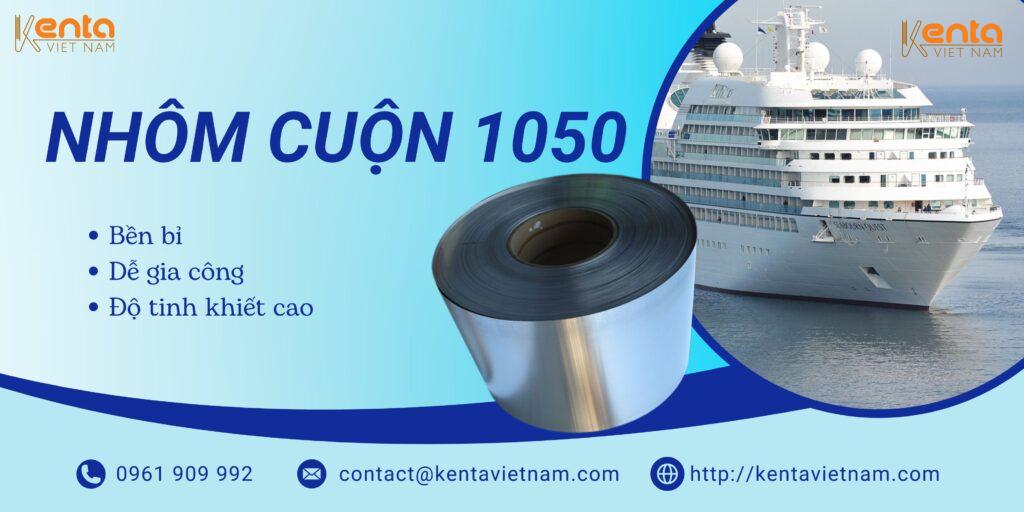Knowledge, Technology
1050 aluminum coil: scientific properties, production process, and selection guide
1050 aluminum coil is a near-pure aluminum form produced in coils, suitable for applications requiring high ductility and surface finish. Due to its good thermal conductivity and deep drawing capabilities, 1050 aluminum coil is often preferred in the packaging, lighting, and architectural decoration industries.
The nature of the alloy and microstructure of 1050 aluminum sheet
1050 aluminum coil belongs to the 1xxx series, with a minimum pure aluminum content of approximately 99.5%. At the micro-level, hot and cold rolling processes significantly impact grain size and dislocation density, leading to noticeable changes in yield strength and ductility. Processing techniques and annealing cycles partly determine the residual stress performance and fatigue behavior of the material in use. A deep understanding of the microstructure helps engineers select the appropriate O or Hxx temper for each type of processing.
1050 aluminum has an elastic modulus comparable to common aluminum alloys, but lower yield strength and tensile strength compared to grades containing magnesium. This makes it not the choice for components subjected to large static loads, but its ductility offers an advantage when deep drawing, stretching, or complex forming is required. In design, all mechanical properties should reference the Mill Test Certificate (MTC) to avoid calculation errors when designing thin components.
Production process and quality control of 1050 aluminum coil
Modern 1050 aluminum coil starts from high-purity ingots, then undergoes hot rolling, cold rolling, and annealing to achieve the desired mechanical properties. Modern factories are equipped with online laser measurement systems to monitor thickness and flatness, and optical scanning cameras to detect surface defects instantly. Each coil shipped comes with an MTC and test report, facilitating traceability and parameter comparison during acceptance.
1050 aluminum coil allows for various surface treatment options depending on the intended use. Anodizing increases the protective oxide layer, improving surface hardness and color adhesion; film coating or electrostatic painting provides aesthetics and weather resistance. Due to limitations in basic strength, after finishing, the adhesion of the coating and surface fatigue should be tested if the component will be subjected to cyclic thermo-mechanical stress to ensure application lifespan.
1050 aluminum coil is easy to process with common cutting, stamping, bending, and welding operations, but note that the heat-affected zone during welding can alter corrosion resistance properties. For components requiring post-weld corrosion protection, surface treatment or selection of a different alloy should be considered before deciding on the manufacturing technology. Early planning with the supplier helps reduce the risk of cracking and tolerance errors in mass production.
1050 aluminum coil has a significant advantage in sustainability when applying recycled scrap. Using recycled aluminum significantly reduces energy consumption compared to production from virgin ore, while also lowering the product's carbon footprint. When green criteria need to be demonstrated for a project, contractors should request recycling reports and environmental certifications from the supplier.
Before warehousing, each coil needs to be cross-referenced with the Mill Test Certificate, dimensions checked, thickness measured, and the surface observed under appropriate lighting conditions. Sampling for tensile testing, determining the material temper, and comparing it with the parameters on the MTC helps detect discrepancies early. Detailed acceptance procedures and thorough record-keeping are key factors in ensuring consistency when the material is introduced into the production line.
Services and support from Kenta Vietnam
Kenta Vietnam Technical Co., Ltd. provides 1050 aluminum coil with MTC, supports sample testing, on-site inspection at the port, and technical consultation on material temper selection and surface treatment options. Kenta advises on processing procedures, provides recommendations on tolerances, and coordinates actual testing to ensure the material meets production requirements. Early collaboration with Kenta helps optimize processing costs and reduce technical risks for projects.
1050 aluminum coil is a suitable choice when high ductility, beautiful surface finish, and good thermal conductivity are required.Understanding the nature of alloys, controlling the production process, and cooperating with reputable suppliers like Kenta Vietnam will help businesses achieve technical and economic efficiency in their applications.
————
KENTA VIETNAM – QUALITY BUILDS TRUST
![]() Main office: No. 22, Phung Cong service area, Phung Cong Commune, Hung Yen province
Main office: No. 22, Phung Cong service area, Phung Cong Commune, Hung Yen province
![]() Warehouse No. 1: Ngo Yen Hamlet, Hong An Ward, Hai Phong City (at the foot of Kien Bridge)
Warehouse No. 1: Ngo Yen Hamlet, Hong An Ward, Hai Phong City (at the foot of Kien Bridge)
![]() Warehouse No. 2: No. 22, Phung Cong service area, Phung Cong Commune, Hung Yen province
Warehouse No. 2: No. 22, Phung Cong service area, Phung Cong Commune, Hung Yen province
![]() Phone: 0972 887 106 – 0961 909 992
Phone: 0972 887 106 – 0961 909 992
![]() Email: contact@kentavietnam.com
Email: contact@kentavietnam.com
![]() Website: kentavietnam.com
Website: kentavietnam.com




















